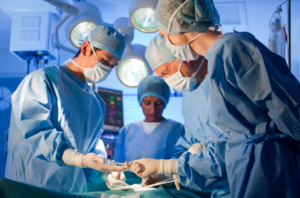
When it comes to emergency surgeries, time is not just critical—it can be life-saving. General surgeons are often the first responders when internal emergencies strike, such as appendicitis, bowel obstructions, or perforated ulcers. Understanding these conditions, their symptoms, and the urgency for surgical intervention can save lives.
In this blog, Dr. Manu Shankar, a leading general surgeon in Faridabad, breaks down the most common emergency surgeries, what causes them, and what patients should expect before and after the operation.
What is Emergency Surgery?
Emergency surgery refers to unplanned surgical procedures that must be performed immediately or within a short window to prevent death or serious harm. Unlike elective surgeries (like gallbladder removal planned in advance), emergency surgeries occur suddenly due to trauma, infection, or acute internal organ issues.
Common Emergency Surgeries in General Practice
Let’s explore the top life-threatening conditions that frequently require immediate surgical attention:
1. Appendicitis
➤ What is it?
Appendicitis is the inflammation of the appendix, a small pouch attached to the large intestine. If not removed in time, it can burst, causing severe infection in the abdomen (peritonitis).
➤ Symptoms:
-
Sharp pain in the lower right abdomen
-
Nausea or vomiting
-
Fever
-
Loss of appetite
-
Abdominal bloating
➤ Surgical Treatment:
Appendectomy (removal of the appendix) is the standard procedure. Dr. Manu Shankar usually performs this using laparoscopic (keyhole) surgery, which leads to faster recovery, less pain, and minimal scarring.
➤ Recovery:
Most patients recover in 1–2 weeks after laparoscopic appendectomy. For open surgery, it may take 2–4 weeks.
2. Bowel Obstruction
➤ What is it?
A bowel obstruction occurs when the intestines are blocked, preventing the normal movement of digestive content. This can lead to infection, perforation, and even death if not treated promptly.
➤ Causes:
-
Hernias
-
Tumors
-
Adhesions (scar tissue) from previous surgeries
-
Intestinal twisting (volvulus)
➤ Symptoms:
-
Severe abdominal pain and cramping
-
Constipation or inability to pass gas
-
Nausea and vomiting
-
Abdominal swelling
➤ Surgical Treatment:
Surgery may involve removing the obstructed segment, releasing the adhesion, or correcting any twist in the bowel. The procedure depends on the cause and location of the blockage.
➤ Recovery:
Patients are usually hospitalized for a few days post-surgery. Early mobilization, fluid management, and a gradual return to a normal diet are essential.
3. Perforated Ulcer
➤ What is it?
A perforated ulcer is a hole in the stomach or intestinal lining caused by untreated ulcers. This allows food and acid to leak into the abdominal cavity, leading to peritonitis.
➤ Symptoms:
-
Sudden, severe abdominal pain
-
Rigid abdomen
-
High fever
-
Rapid heartbeat
➤ Surgical Treatment:
Emergency surgery is needed to close the perforation and clean the abdominal cavity. Laparoscopic methods may be used depending on the patient’s condition.
4. Strangulated Hernia
➤ What is it?
A hernia occurs when an organ pushes through a weak spot in the muscle wall. If the blood supply to the herniated section is cut off, it becomes a strangulated hernia—a surgical emergency.
➤ Symptoms:
-
Sudden, intense pain at the hernia site
-
Nausea and vomiting
-
Redness and swelling
-
Inability to push the hernia back in
➤ Surgical Treatment:
Immediate surgery is performed to remove or reduce the hernia and restore blood flow. Delays can result in tissue death and serious infection.
5. Gallbladder Infection (Acute Cholecystitis)
➤ What is it?
When gallstones block the bile ducts, it can lead to an inflamed gallbladder, also known as acute cholecystitis. If untreated, the gallbladder can rupture.
➤ Symptoms:
-
Right upper abdominal pain
-
Fever and chills
-
Nausea
-
Jaundice (in some cases)
➤ Surgical Treatment:
An emergency laparoscopic cholecystectomy (gallbladder removal) is often recommended.
6. Trauma-Related Internal Injuries
➤ What is it?
Accidents can cause internal bleeding or organ damage that require immediate surgical repair—especially injuries to the spleen, liver, or intestines.
➤ Symptoms:
-
Unexplained drop in blood pressure
-
Abdominal distension
-
Signs of internal bleeding (shock)
➤ Surgical Treatment:
Emergency laparotomy (open abdominal surgery) or laparoscopic procedures are performed to stop bleeding and repair damage.
What to Expect Before Emergency Surgery
In an emergency, preparation time is minimal. However, the surgical team will:
-
Conduct a rapid clinical assessment
-
Perform essential diagnostics (e.g., ultrasound, CT scan, blood work)
-
Stabilize the patient with IV fluids, antibiotics, or pain control
-
Obtain informed consent from patient or next-of-kin
Post-Operative Care & Recovery
Emergency surgeries often require longer recovery than elective procedures due to the body’s heightened stress and possible complications. Key components include:
-
Pain management
-
Monitoring for infection or complications
-
Nutritional support
-
Wound care
-
Physiotherapy or early mobilization to avoid blood clots
Dr. Manu Shankar and his team provide personalized post-surgical care plans to help patients return to daily life safely and quickly.
When Should You Seek Emergency Surgical Help?
Never ignore symptoms like:
-
Sudden and severe abdominal pain
-
Continuous vomiting
-
Inability to pass stools or gas
-
Swelling or discoloration at hernia sites
-
Signs of internal bleeding or trauma
These symptoms can signal conditions that worsen quickly and demand urgent attention.
Why Choose Dr. Manu Shankar for Emergency Surgeries in Faridabad?
Dr. Manu Shankar is one of the most trusted and experienced general surgeons in Faridabad, known for his prompt decision-making, advanced laparoscopic skills, and compassionate patient care.
✔️ Over 15 years of surgical experience
✔️ Expertise in laparoscopic and open emergency procedures
✔️ State-of-the-art operation theatres and ICU backup
✔️ 24×7 emergency care access at affiliated hospitals
Final Thoughts
Emergency surgeries are not planned, but with the right awareness and expert care, outcomes can be significantly improved. If you or your loved ones experience any of the warning signs mentioned above, don’t delay seeking medical help.

